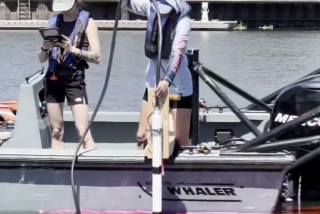Decontamination Duty at McGrath Lake : Cleanup: Crews scrub the tools used to mop up the spilled oil. It’s a cycle that will be repeated over and over.
- Share via
It was one of the dirtiest of all the dirty jobs--clean up after the cleanup crews. And Javier Rodriguez and Raul Melgoza got the call.
*
On a patch of sand covered with plastic tarp and hemmed in by sodden sandbags, the two men spent 12 hours Wednesday scraping clots of black goo off the tools used to corral oil from Oxnard’s McGrath Lake and the nearby beach.
As soon as the booms, skiffs, shovels and rakes came clean--scrubbed and polished to a shine--beach patrol crews collected them and dragged them off for another dip into the sticky ooze.
Soil and scrub, contaminate and cleanse. The cycle would be repeated countless times Wednesday--and every day that workers tackle the mess.
“Every piece of equipment must be cleaned every day,” said Eric Vang, a superintendent for Clark Engineering & Construction, the general contractor in charge of cleaning up the 84,000 gallons of runaway crude.
“If you put a dirty boat in the water, you’re defeating your purpose,” Vang said.
While wildlife rescue teams and wetlands cleanup squads took charge of high-profile chores around tiny McGrath Lake, dozens of workers toiled around the clock on decontamination duty.
They sloughed gobs of oil off the rakes used to comb through tainted soil. They blasted floating booms with water from a high-pressure hose. They scrubbed the boats that carried cleanup crews over the slick lake.
“I feel good because I’m helping out,” Melgoza said.
“They looked like that and now they look like this, so we’re doing good,” Rodriguez said, gesturing first to a pile of oil-spattered tools and then to the cleaned implements. “The job’s not hard--a little dirty, though.”
But then, all jobs on an oil spill cleanup are at least a little dirty.
To take care of the grungy crews, a decontamination center was set up just a few feet away from the equipment cleansing site.
In the center--roped off with red tape--every worker had to submit to rigorous inspections before leaving the site or taking a food break.
They stuck their steel-toed boots in a pressure cleaner, then stripped off their lightweight rain suits and thick, black gloves. They also had to shuck any street clothes flecked with oil.
One unfortunate worker, who had somehow let the crude spatter his shirt and jeans despite protective clothing, ended up nearly naked. He had to go home wearing only disposable yellow coveralls.
“I must have bought $25,000 worth of supplies in the last three days,” said Todd Waters, a supervisor with Ecology Control Industries. “The guys may go through three or four pairs of gloves a day. This is a pretty costly operation.”
Bush Oil Co., owner of the ruptured pipeline, has said its insurance will cover the full cost of the cleanup. But a company spokesman could not estimate how much that might be.
Workers on the scene, however, said their efforts had exacted a considerable toll, physically and emotionally.
Slogging through the thick reeds surrounding McGrath Lake searching out oil-coated birds was exhausting and depressing, said Mark Russell of International Bird Rescue.
Most of the dead birds suffocated in the oil, which crept up their nostrils and plugged their windpipes. Those that survived the slick often suffer from hypothermia, as the crude mats their feathers and exposes their skin to the chill water.
After devoting 15 hours Tuesday to the rescue mission, Russell said he thought that his team had found most of the spill’s initial wildlife victims. Blasts from an air gun scared away other birds trying to land on the lake.
Optimistic that the body count would slow Wednesday, Russell said: “I’m hoping to make it a 12-hour day.”
More to Read
Sign up for Essential California
The most important California stories and recommendations in your inbox every morning.
You may occasionally receive promotional content from the Los Angeles Times.













